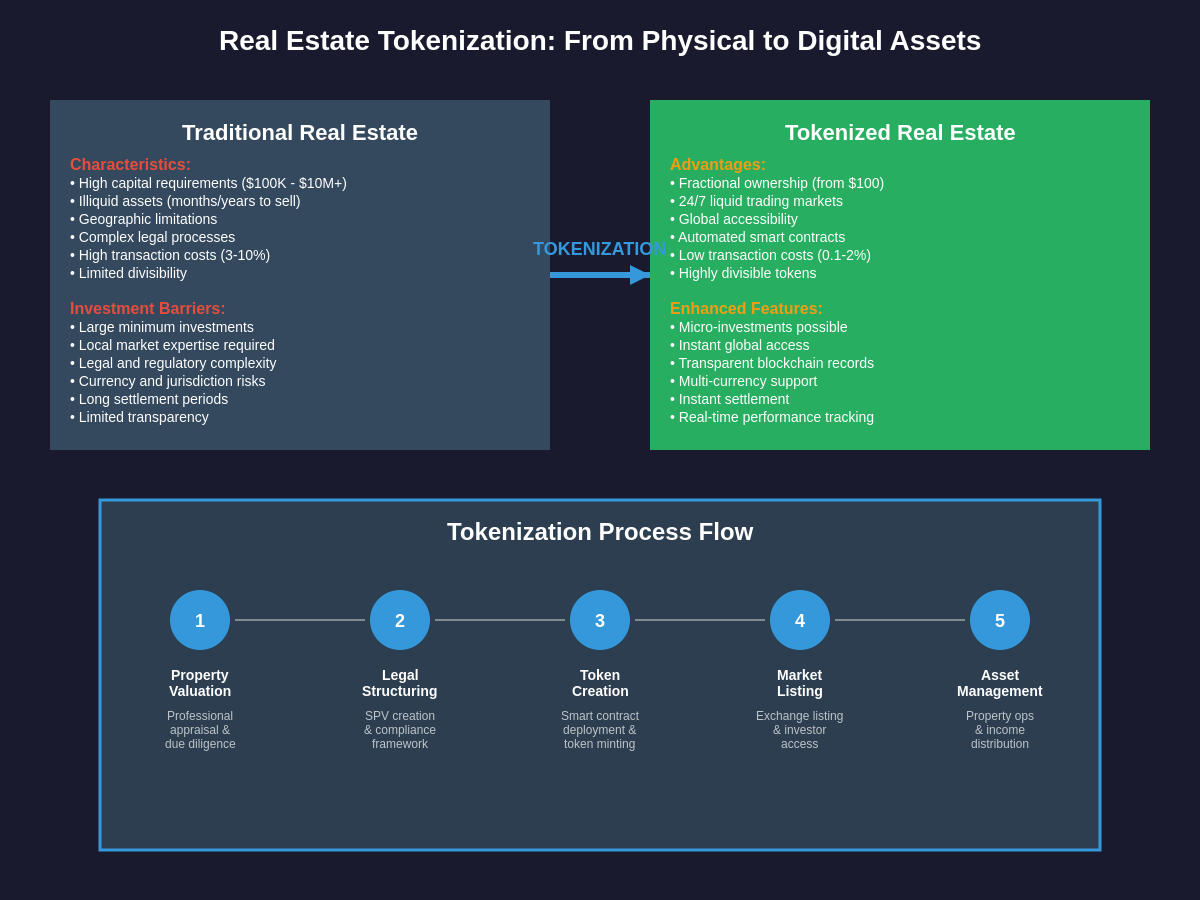
The convergence of blockchain technology and real estate is creating unprecedented opportunities for property investment and ownership. Real Estate Non-Fungible Tokens represent a revolutionary approach to property tokenization that democratizes access to real estate markets worldwide while providing enhanced liquidity, fractional ownership capabilities, and transparent transaction mechanisms. This technological transformation addresses longstanding challenges in traditional real estate investment, including high capital barriers, geographical limitations, and complex ownership structures, while opening doors for global investors to participate in diverse property markets previously inaccessible to individual investors.
The Foundation of Real Estate Tokenization
Real estate tokenization fundamentally transforms how property ownership is structured and transferred by converting physical real estate assets into digital tokens on blockchain networks. Each token represents a verifiable ownership stake in a specific property, complete with immutable records of ownership history, property details, and investment terms stored on distributed ledgers. This process begins with comprehensive property evaluation and legal structuring that ensures compliance with local regulations while creating legally binding ownership rights for token holders. Professional appraisers, legal experts, and blockchain developers collaborate to establish tokenization frameworks that protect investor interests while maintaining regulatory compliance across multiple jurisdictions.
The technical infrastructure supporting real estate tokenization relies on smart contracts that automate various aspects of property management and investment distribution. These self-executing contracts handle rental income distribution, maintenance fee allocation, voting rights for major property decisions, and exit mechanisms for token holders. Smart contracts eliminate intermediaries in many traditional real estate transactions, reducing costs and increasing efficiency while ensuring transparent and predictable execution of investment terms. Institutional investors monitoring real estate investment trusts and property market trends can leverage these tokenization platforms to diversify their portfolios with fractional real estate positions across global markets.
Property tokenization creates new investment vehicles that combine the stability of real estate with the liquidity advantages of digital assets. Token holders benefit from potential property appreciation, rental income streams, and the ability to trade their ownership stakes on secondary markets without the lengthy processes associated with traditional real estate transactions. This liquidity transformation addresses one of real estate’s primary limitations as an investment class, enabling investors to adjust their exposure to specific properties or markets based on changing economic conditions or investment strategies.
Market Accessibility and Global Investment Opportunities
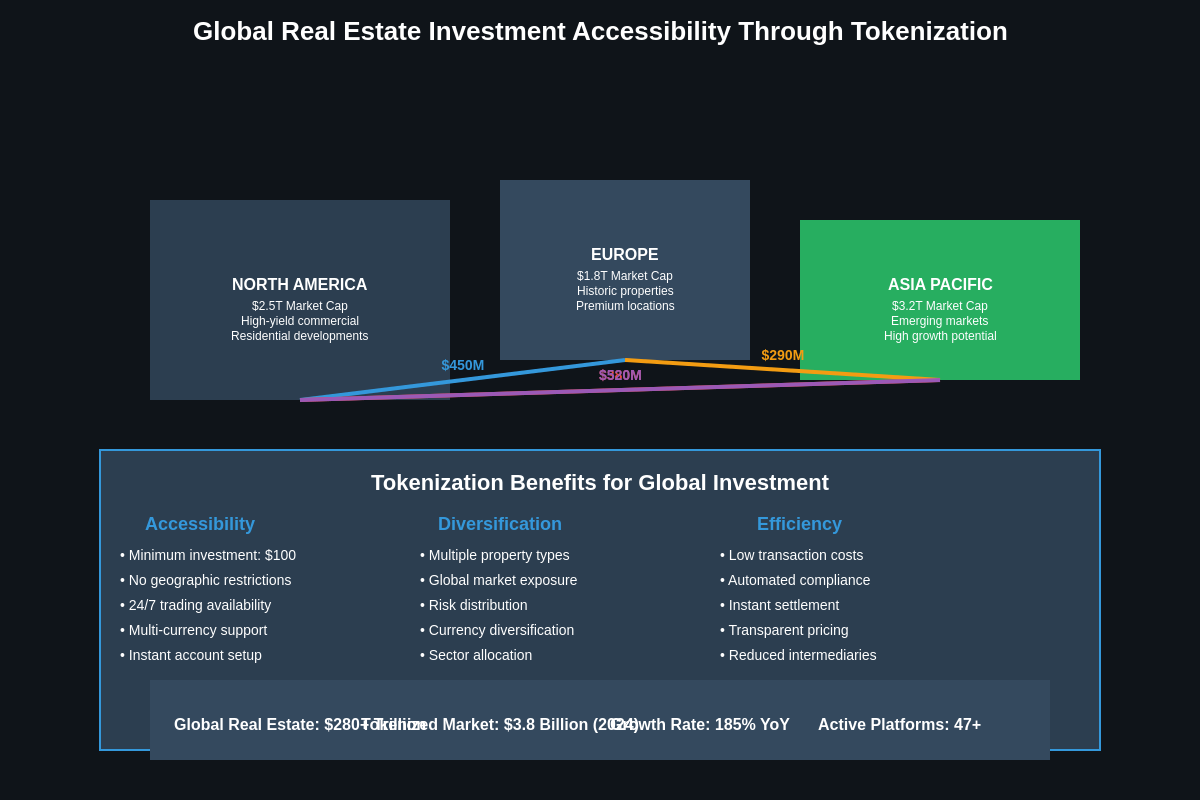
Traditional real estate investment has historically required substantial capital commitments, local market knowledge, and complex legal arrangements that exclude many potential investors from participating in lucrative property markets. Real estate NFTs eliminate these barriers by enabling fractional ownership structures where investors can purchase tokens representing small percentages of high-value properties. A luxury commercial building in Manhattan or a prime residential development in London becomes accessible to investors worldwide through tokenization, allowing portfolio diversification across geographic markets and property types that would otherwise require millions in direct investment capital.
Geographic accessibility represents another transformative aspect of real estate tokenization. International property investment traditionally involves navigating foreign legal systems, currency exchange risks, tax implications, and local partnership requirements that create significant complexity and costs. Tokenized real estate platforms provide standardized investment frameworks that simplify cross-border property investment while maintaining compliance with local regulations through partnerships with licensed real estate operators and legal entities in each jurisdiction.
The democratization of real estate investment extends beyond individual investors to include institutional players seeking efficient exposure to global property markets. Investment funds, pension funds, and corporate treasuries can allocate capital to real estate tokens representing diversified property portfolios without establishing local entities or managing direct property operations. This institutional accessibility increases overall market liquidity and provides validation for retail investors considering real estate token investments. Professional portfolio managers utilize comprehensive market analysis tools to evaluate tokenized real estate opportunities alongside traditional investment vehicles.
Emerging markets particularly benefit from real estate tokenization as it connects local property developers with global capital sources. Developers in regions with limited local investment capital can tokenize their projects to attract international funding while providing global investors access to high-growth markets with attractive returns. This capital flow democratization accelerates development in emerging economies while offering investors exposure to markets with significant appreciation potential.
Legal Framework and Regulatory Compliance
The regulatory landscape for real estate NFTs varies significantly across jurisdictions, creating complex compliance requirements for tokenization platforms and investors. Securities regulations in many countries classify real estate tokens as investment securities, subjecting them to registration requirements, investor accreditation standards, and ongoing disclosure obligations. Platforms must navigate these regulatory frameworks while ensuring that token structures comply with property laws, tax regulations, and anti-money laundering requirements in each operating jurisdiction.
Legal ownership structures for tokenized real estate typically involve special purpose vehicles or trusts that hold actual property title while issuing tokens representing ownership interests in these entities. This structure protects token holders’ rights while ensuring that property ownership remains compliant with local real estate laws that may not recognize direct blockchain-based ownership. Sophisticated legal engineering creates seamless integration between traditional property law and blockchain-based ownership records, providing token holders with enforceable rights while maintaining regulatory compliance.
Cross-border regulatory harmonization remains an ongoing challenge as different countries develop distinct approaches to real estate tokenization. Some jurisdictions embrace innovation with supportive regulatory frameworks, while others maintain restrictive approaches that limit tokenization activities. Successful platforms must adapt to this regulatory patchwork while advocating for clearer guidelines that protect investors without stifling innovation in digital real estate investment.
Consumer protection measures become particularly important in real estate tokenization given the complexity of property investment and the potential for fraud in digital asset markets. Regulatory frameworks increasingly require comprehensive disclosure of property information, investment risks, management fees, and exit mechanisms to ensure that investors make informed decisions. These protections help build confidence in tokenized real estate markets while preventing exploitation of less sophisticated investors.
Technology Infrastructure and Platform Development
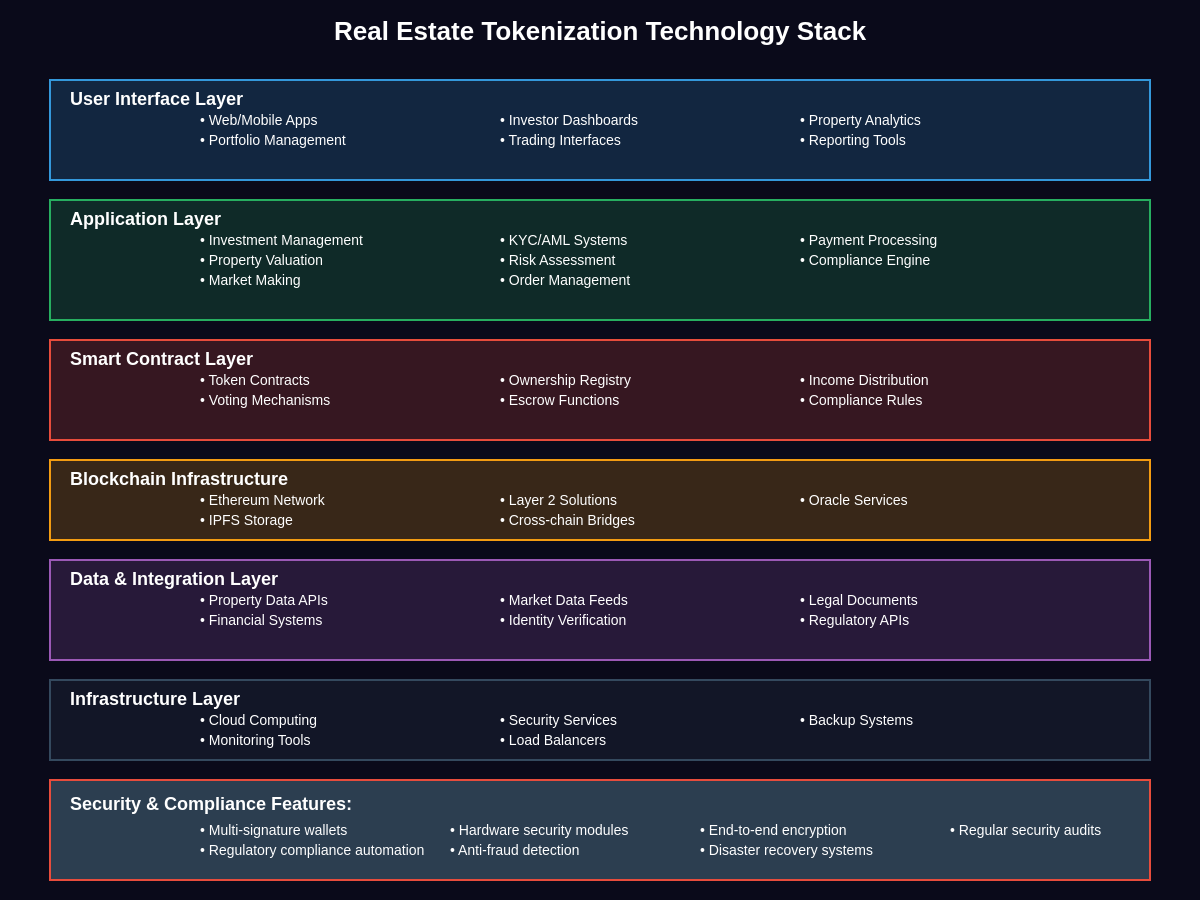
Real estate tokenization platforms require sophisticated technology infrastructure that integrates blockchain networks, property management systems, legal compliance tools, and user interfaces that serve diverse investor populations. The underlying blockchain infrastructure must support complex smart contracts while providing scalability for large-scale property tokenization and secondary market trading. Leading platforms utilize established blockchain networks like Ethereum while exploring layer-2 solutions that reduce transaction costs and improve performance for frequent trading activities.
Property data integration represents a critical component of tokenization platforms as investors require comprehensive information about underlying assets, market conditions, and performance metrics. Platforms must aggregate data from multiple sources including property management systems, local market databases, financial reporting systems, and regulatory filings to provide transparent and up-to-date information for token holders. Advanced analytics capabilities enable investors to evaluate tokenized properties using sophisticated metrics comparable to traditional real estate investment analysis.
User experience design becomes crucial for attracting mainstream investors to real estate tokenization platforms. Interfaces must balance comprehensive information presentation with intuitive navigation that serves both sophisticated institutional investors and retail participants new to blockchain-based investment. Educational resources, portfolio management tools, and responsive customer support help users navigate the complexities of tokenized real estate investment while building confidence in these new investment vehicles.
Security infrastructure must protect both digital assets and sensitive property information from cyber threats while ensuring compliance with data protection regulations. Multi-layered security approaches include cold storage for token custody, encryption for sensitive data, regular security audits, and insurance coverage for potential losses. These security measures help establish institutional confidence in tokenization platforms while protecting individual investors from potential risks associated with digital asset custody.
Investment Mechanics and Portfolio Integration
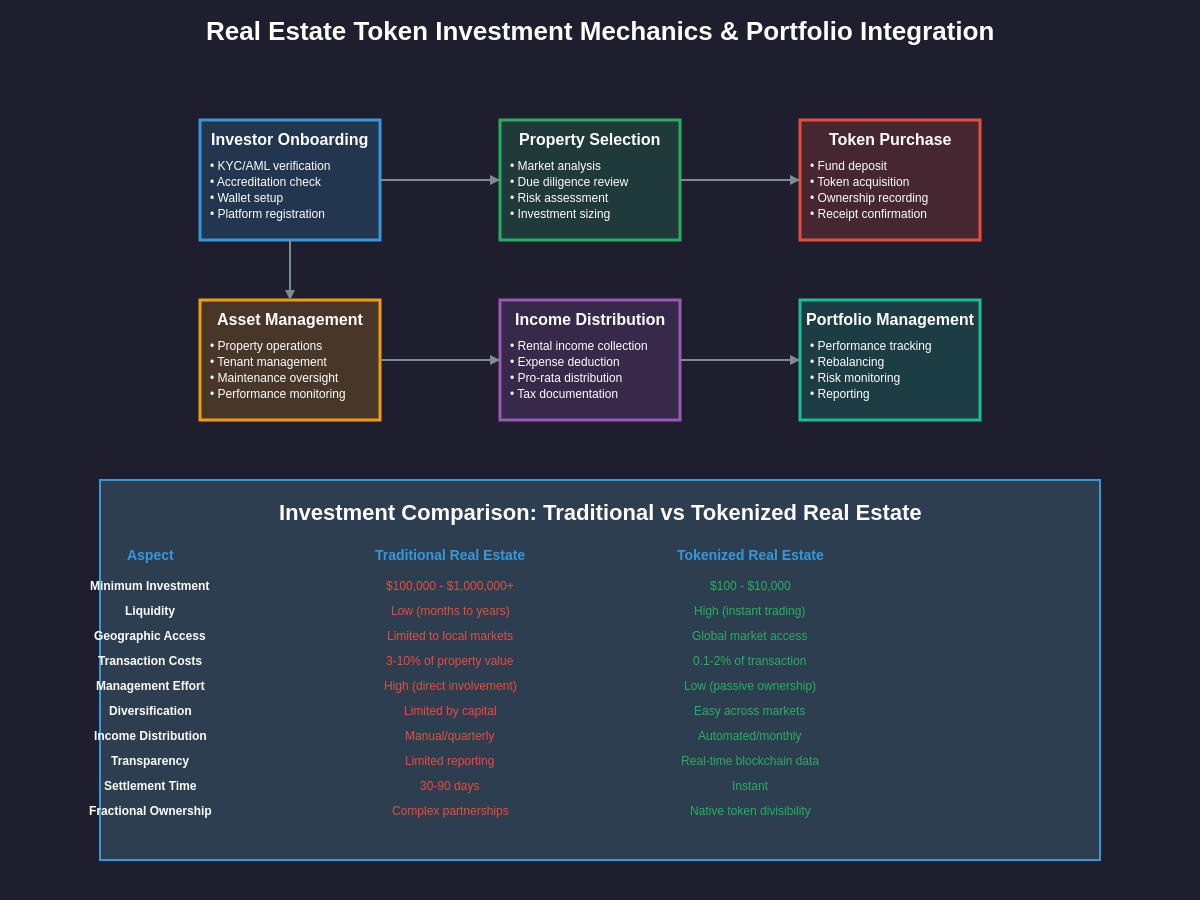
Real estate token investment mechanics differ significantly from traditional property investment in terms of capital requirements, liquidity options, and portfolio management capabilities. Investors can begin building real estate exposure with relatively modest capital commitments, purchasing tokens that represent fractional ownership in high-value properties across multiple markets and property types. This fractional approach enables sophisticated diversification strategies that would require substantial capital commitments through traditional real estate investment channels.
Secondary market trading provides liquidity advantages that transform real estate from an illiquid investment class into a more dynamic portfolio component. Token holders can adjust their real estate exposure based on market conditions, rebalance portfolios without lengthy sale processes, and capture short-term trading opportunities based on property market fluctuations. Advanced traders monitor real estate sector performance indicators to identify optimal entry and exit points for their tokenized property positions.
Income distribution mechanisms through smart contracts automate rental income payments to token holders, eliminating delays and administrative costs associated with traditional real estate investment partnerships. Monthly or quarterly distributions provide predictable income streams while maintaining transparent records of all payments and expenses. Token holders receive detailed reporting on property performance, occupancy rates, maintenance expenses, and market valuations that enable informed investment decisions.
Tax implications for real estate token investments vary by jurisdiction and investor status, requiring careful consideration of capital gains treatment, income tax obligations, and international tax treaties. Tokenization platforms increasingly provide tax reporting tools and documentation to help investors comply with their tax obligations while maximizing after-tax returns. Professional tax advisors specializing in digital assets and real estate investment help investors navigate these complex requirements.
Market Dynamics and Pricing Mechanisms
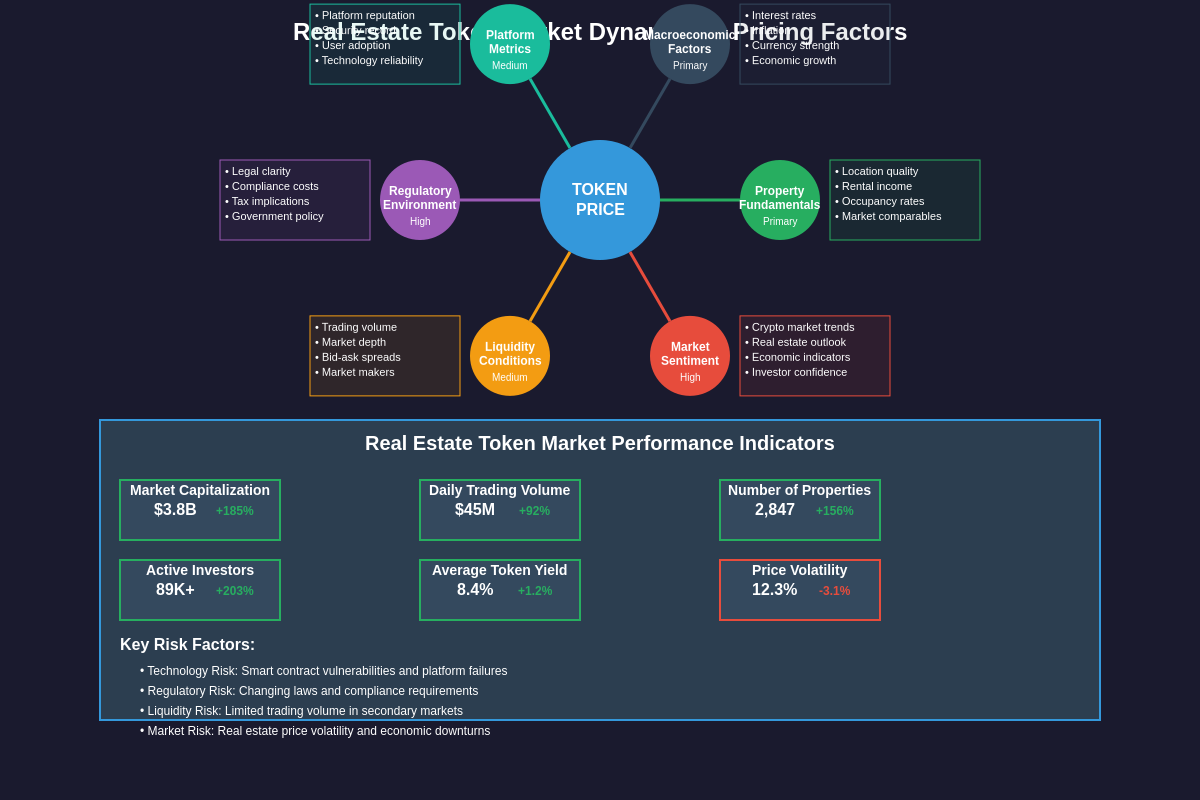
Real estate token markets exhibit unique pricing dynamics that reflect both underlying property values and digital asset market behaviors. Token prices incorporate traditional real estate valuation factors including location, property condition, rental income potential, and market comparables while also responding to broader cryptocurrency market sentiment and liquidity conditions. This dual influence creates pricing opportunities for sophisticated investors who understand both real estate fundamentals and digital asset market dynamics.
Market making and liquidity provision become critical components of successful real estate tokenization platforms as thin trading volumes can create significant price volatility that deters institutional participation. Professional market makers provide continuous buy and sell orders that improve price discovery while reducing trading costs for investors. Automated market maker protocols adapted for real estate tokens help maintain orderly trading while providing fair valuations based on underlying property performance.
Price discovery mechanisms must balance real-time trading activity with periodic property valuations that reflect changing real estate market conditions. Regular property appraisals, occupancy updates, and market analysis inform fair value calculations that help establish appropriate token pricing ranges. Sophisticated investors utilize this information asymmetry to identify undervalued tokens while contributing to more efficient price discovery across tokenized real estate markets.
Correlation analysis between tokenized real estate and traditional asset classes provides valuable insights for portfolio construction and risk management. Real estate tokens may exhibit different correlation patterns compared to direct property investment due to their digital asset characteristics and enhanced liquidity. Investment managers study these relationships to optimize portfolio allocations while maintaining desired risk-return profiles. Professional analysts use advanced charting tools and correlation analysis to evaluate the diversification benefits of including real estate tokens in broader investment portfolios.
Global Market Integration and Cross-Border Investment
Real estate tokenization facilitates unprecedented global market integration by standardizing investment processes across different countries and property types. Investors can build diversified international real estate portfolios through single platforms that handle currency conversion, regulatory compliance, and local market expertise. This integration reduces the complexity and costs associated with international property investment while providing access to markets with attractive risk-adjusted returns.
Currency risk management becomes an important consideration for global real estate token investment as property values, rental income, and token trading may occur in different currencies. Sophisticated platforms provide hedging mechanisms or multi-currency token structures that help investors manage foreign exchange exposure while maintaining exposure to underlying property performance. These currency management tools enable more precise risk management for international real estate portfolios.
Time zone arbitrage opportunities emerge as tokenized real estate markets operate continuously while underlying property markets follow local business hours and market conditions. Active traders can capitalize on information asymmetries and timing differences between regions while long-term investors benefit from continuous market access for portfolio rebalancing and liquidity management.
Regulatory arbitrage considerations influence platform development and investor behavior as different jurisdictions offer varying levels of regulatory clarity and investor protection. Platforms may establish operations in favorable regulatory environments while serving global investor bases, creating competitive advantages for jurisdictions that provide clear and supportive frameworks for real estate tokenization.
Risk Management and Due Diligence
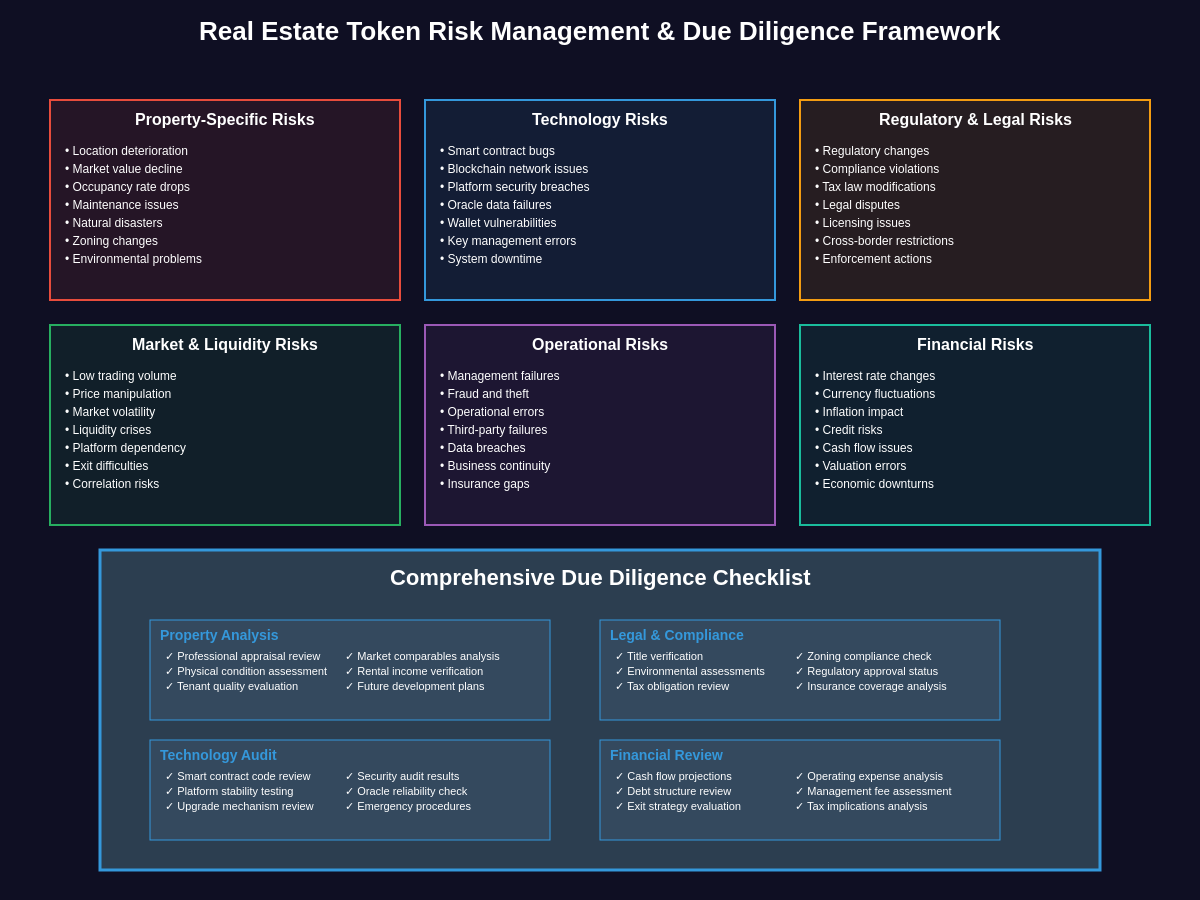
Risk assessment for real estate tokens requires evaluation of both traditional property investment risks and additional factors unique to blockchain-based ownership structures. Property-specific risks include market value fluctuations, occupancy changes, maintenance expenses, and local economic conditions that affect rental demand and property values. Token-specific risks encompass smart contract vulnerabilities, platform operational risks, regulatory changes, and liquidity constraints in secondary markets.
Due diligence processes for tokenized real estate must address technical, legal, and financial aspects of both the underlying property and the tokenization structure. Investors should evaluate property quality, location characteristics, management team capabilities, and financial projections while also assessing smart contract security, platform track record, and regulatory compliance measures. Professional due diligence services specializing in tokenized real estate help investors navigate these complex evaluation requirements.
Insurance and risk mitigation strategies for real estate tokens include traditional property insurance, cyber liability coverage, and specialized policies for digital asset platforms. Comprehensive risk management approaches protect against property damage, technology failures, regulatory changes, and operational disruptions that could affect token values or investor returns. These protective measures help build institutional confidence while reducing potential losses for individual investors.
Concentration risk management becomes particularly important as investors can easily accumulate exposure to specific markets, property types, or platforms through tokenized real estate investment. Diversification strategies should consider geographic distribution, property sector allocation, and platform risk distribution to avoid excessive concentration in any single risk factor. Portfolio monitoring tools help investors maintain appropriate diversification while pursuing attractive investment opportunities.
Future Market Development and Innovation
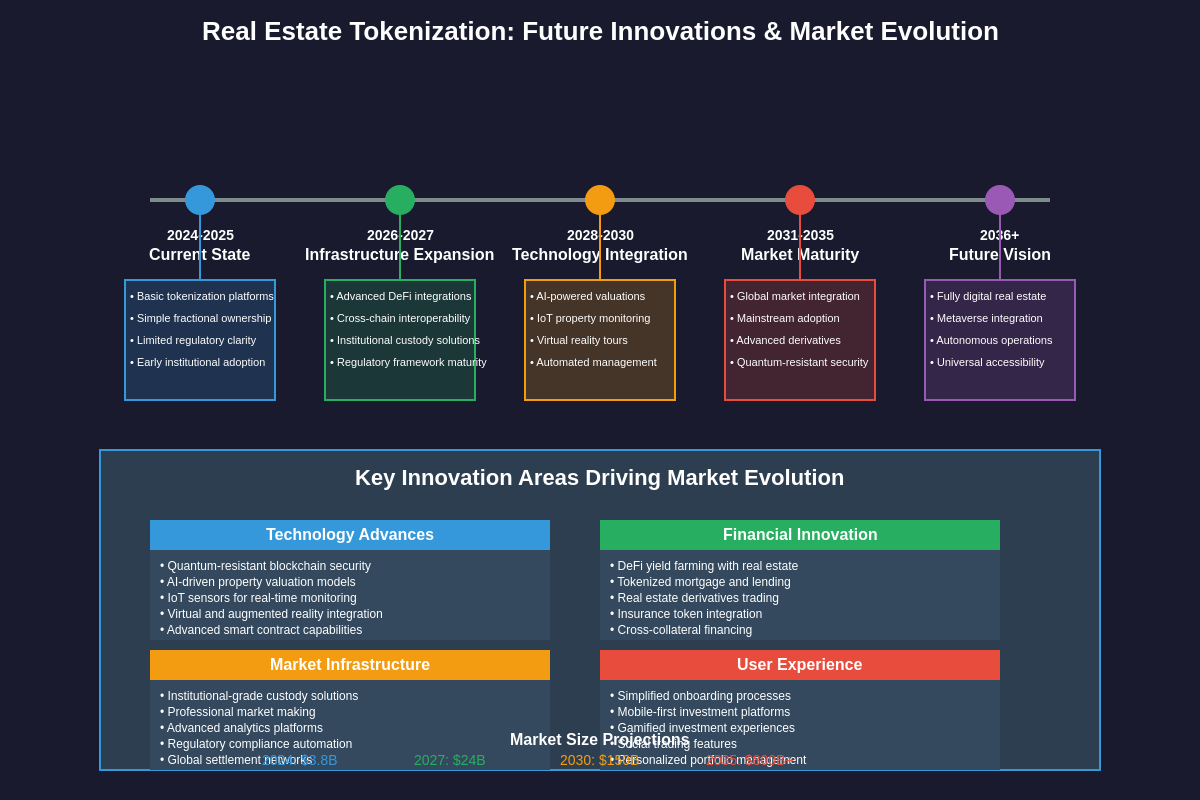
The real estate tokenization market continues to evolve with technological advances, regulatory developments, and increasing institutional adoption that expand market opportunities and improve investor experiences. Emerging technologies including artificial intelligence, Internet of Things sensors, and augmented reality create new possibilities for property management, valuation, and investor engagement that enhance the value proposition of tokenized real estate investment.
Institutional infrastructure development includes custody solutions, prime brokerage services, and institutional-grade trading platforms that support large-scale real estate token investment. These developments reduce operational barriers for institutional investors while providing the sophisticated tools and services required for professional portfolio management. Institutional adoption accelerates market maturity while increasing overall liquidity and price stability.
Integration with decentralized finance protocols creates new opportunities for leveraging real estate tokens, earning yield through liquidity provision, and accessing credit facilities backed by property tokens. These DeFi integrations enhance the utility and return potential of real estate tokens while creating new risk management tools for sophisticated investors. Market participants monitor decentralized finance trends and developments to identify emerging opportunities in tokenized real estate markets.
Cross-chain interoperability developments enable real estate tokens to operate across multiple blockchain networks, improving liquidity and reducing technology risk concentration. Multi-chain strategies provide flexibility for platform development while ensuring that investors maintain access to their tokens regardless of specific blockchain network performance or adoption trends.
Investment Strategy Considerations
Strategic approaches to real estate token investment range from passive diversification strategies to active trading approaches that capitalize on market inefficiencies and arbitrage opportunities. Long-term investors may focus on high-quality properties in stable markets with strong rental income potential, while active traders might pursue short-term opportunities based on market sentiment, property news, or technical analysis patterns.
Geographic allocation strategies for tokenized real estate consider economic growth prospects, demographic trends, regulatory environments, and currency stability across different markets. Emerging market exposure can provide attractive returns but requires careful risk assessment, while developed market properties offer stability and liquidity advantages. Balanced approaches combine growth and stability characteristics while maintaining appropriate risk levels for investor objectives.
Sector allocation within real estate tokens encompasses residential, commercial, industrial, and specialized property types that exhibit different risk-return characteristics and market cycle behaviors. Residential properties provide stability and consistent rental income, while commercial properties offer higher yield potential with increased complexity. Industrial and specialized properties serve specific market niches with unique investment characteristics that require specialized expertise.
Exit strategy planning becomes crucial for real estate token investors as market conditions and personal circumstances change over time. Secondary market liquidity provides flexibility for partial or complete position exits, while platform-sponsored buyback programs or property sale events offer alternative exit mechanisms. Understanding available exit options helps investors make informed initial investment decisions while maintaining appropriate portfolio flexibility.
The transformation of real estate investment through tokenization represents a fundamental shift toward more accessible, liquid, and globally integrated property markets. As technology infrastructure matures, regulatory frameworks develop, and institutional adoption increases, real estate tokens are positioned to become significant components of diversified investment portfolios. Investors who understand both traditional real estate fundamentals and digital asset market dynamics can capitalize on this emerging opportunity while contributing to the development of more efficient and inclusive property investment markets. The continued evolution of real estate tokenization promises to democratize access to property investment while creating new opportunities for value creation and portfolio optimization in the global investment landscape.
Professional investors and institutions require sophisticated analytical tools and market intelligence to navigate the complexities of tokenized real estate markets and identify optimal investment opportunities across this rapidly evolving asset class.
Disclaimer: This article is for educational and informational purposes only and should not be construed as financial advice. Real estate and cryptocurrency investments carry significant risks, including the potential for total loss of capital. Tokenized real estate investments may be subject to additional risks related to technology, regulation, and market liquidity. Always conduct your own research and consult with qualified financial advisors before making investment decisions. The author and publisher are not responsible for any financial losses that may occur from acting on the information provided in this article.